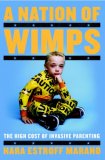Summary | Excerpt | Reviews | Beyond the Book | Readalikes | Genres & Themes | Author Bio

 Book Reviewed by:
Book Reviewed by:
Jo Perry
Buy This Book
Programs like Zangle are "feeding parental obsessiveness," insists a parent of two young girls in Birmingham, Michigan, who "forced myself to pull back and not do what everyone else does—because I'm not the one who has to prepare for college. The parents spend all day checking in on their kids. They demand to see all their kid's assignments. Sometimes the teachers are forced to say, 'It's your son's homework, not yours.' "
"Do We Need a Speech Therapist?"
Parental pushiness and protectionism gain momentum as children move from preschool to primary school to high school. Not long ago, parents might have thought their function was, say, to provide good nutrition at home, recognize that direct parental control extends only so far, and, on a sliding scale from begrudgingly to confidently, grant their kids increments of freedom along with allowance money to make choices on their own outside the house, even if the choices were sometimes less than perfect. Zangle and other monitoring programs beginning with kindergarten train parents in intrusiveness and normalize it, even celebrate it, without accommodating so much as a whimper of protest—all the while disrupting the fragile flow of trust that development toward independence has always required and still does.
"I noticed it immediately with my then-one-year-old when we moved to suburban Connecticut from a more alternative community in the Southwest," reports the mother of a four-year-old boy and a seventeen-month-old daughter. "How many words was my child saying? Did he know his alphabet? When could he write his name? Do we need a speech therapist? I know parents of a three-year-old who monitor their child so obsessively they send him to an occupational therapist two times a week to work on scissor skills—for no discernible reason." The mother of two confesses that she herself "took my son in to the occupational therapist to be evaluated after his preschool teacher said something about his fine motor skills. Now, mind you, he is highly verbal, he can read, he is a fine artist. But I took him in for an evaluation. I'm not proud of it. It forced me to do some soul-searching, and we never went back."
The push for achievement in all quantifiable realms, especially the academic, begins so early that preschools all around the country are focusing less and less on the development of social skills and self-regulation and more and more on academics. However, children of that age are so unready for curricular focus that preschools report a rising tide of behavioral problems—-and wind up expelling six out of every thousand students. Imagine: expelled from preschool! With so much expected of them when they have not yet mastered socialization and self-regulation—two skills that are intricately interconnected and both of which foster academic excellence—more of them are acting out. Expectations for children have gone completely haywire, untethered from any reference to children's developmental needs, referenced only to deep adult anxieties. "The great effect of Head Start was to convince the upper middle class that their children need a head start and they could do it better," says the historian Steven Mintz, professor at the University of Houston and author of Huck's Raft: A History of American Childhood.
Inside the Hothouse
Childhood under the constant gaze of adults is a new and growing phenomenon. The idea that a life—anyone's life—is on some precise schedule amenable to control is a by-product of the syllogisms of success that parents today are frenetically writing for their children.
The giant Citigroup company was rocked by scandal in 2002 when one of its superstar stock analysts, Jack Grubman, bragged in an e-mail that he had upgraded the rating of then-flagging AT&T stock to curry favor with Citigroup's then chairman, Sanford Weill. Grubman's overarching goal was to get Weill, a prominent New York figure, to exert his influence to get Grubman's twin toddlers into one of New York's prestigious preschools. (AT&T's chairman sat on the board of Citigroup and was a client of Citigroup, and Weill sat on the AT&T board.) What made the preschool so essential, apparently, was its track record in sending its graduates to the elite private grammar schools that in turn feed the prestigious prep schools which in turn dump their graduates into the Ivy League. It was the first logical step in the syllogism of academic success that parents construct for their children: if this is the right kindergarten for Harvard and Elijah gets into it, then he will be on track for Harvard. In the hothouse that child raising has become, nothing is left to chance. (Weill made the call, and the Grubman twins were admitted, once Citigroup pledged a million dollars to the school's umbrella organization.)
Excerpted from A Nation of Wimps by Hara Estroff Marano Copyright © 2008 by Hara Estroff Marano. Excerpted by permission of Broadway, a division of Random House, Inc. All rights reserved. No part of this excerpt may be reproduced or reprinted without permission in writing from the publisher.





The House on Biscayne Bay
by Chanel Cleeton
As death stalks a gothic mansion in Miami, the lives of two women intertwine as the past and present collide.

The Flower Sisters
by Michelle Collins Anderson
From the new Fannie Flagg of the Ozarks, a richly-woven story of family, forgiveness, and reinvention.

The Funeral Cryer by Wenyan Lu
Debut novelist Wenyan Lu brings us this witty yet profound story about one woman's midlife reawakening in contemporary rural China.
Your guide toexceptional books
BookBrowse seeks out and recommends the best in contemporary fiction and nonfiction—books that not only engage and entertain but also deepen our understanding of ourselves and the world around us.